Alice in Wonderland
 for fantasy action/violence involving scary images and situations, and for a smoking caterpillar.
for fantasy action/violence involving scary images and situations, and for a smoking caterpillar.
Reviewed by: Angela Bowman
CONTRIBUTOR
| Moral Rating: | Offensive |
| Moviemaking Quality: |
|
| Primary Audience: | Family Teens Adults |
| Genre: | Action Adventure Fantasy 3D Family Adaptation |
| Length: | 1 hr. 48 min. |
| Year of Release: | 2010 |
| USA Release: |
March 5, 2010 (wide—3,400+ theaters) DVD: June 1, 2010 |
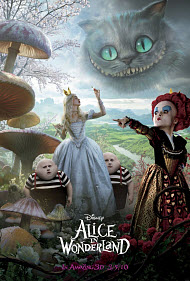

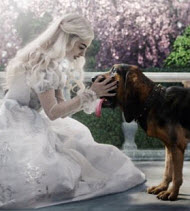
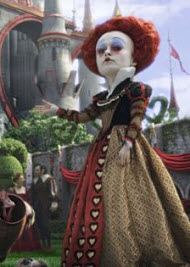

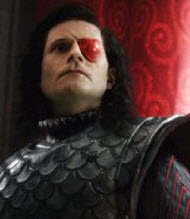
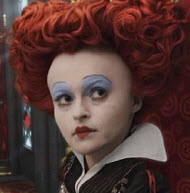
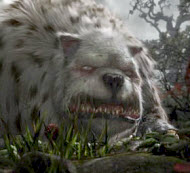
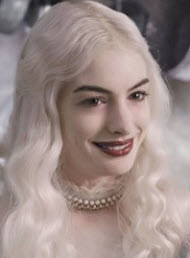
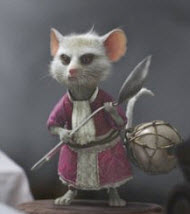
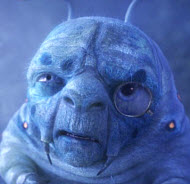
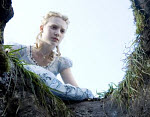
Caterpillars in the Bible
| Featuring |
|---|
|
Mia Wasikowska (Alice Kingsley) Johnny Depp (The Mad Hatter) Helena Bonham Carter (The Red Queen) Crispin Glover (The Knave of Hearts) Anne Hathaway (The White Queen) Stephen Fry (The Cheshire Cat) Christopher Lee (The Jabberwock) Michael Sheen (The White Rabbit) Alan Rickman (Absolem, The Caterpillar) Matt Lucas (Tweedledee / Tweedledum) Timothy Spall (The Bloodhound) Barbara Windsor (The Dormouse) Amy Bailey (Hatteress) See all » |
| Director |
|
Tim Burton |
| Producer |
| Walt Disney Pictures, Roth Films, The Zanuck Company, Team Todd, Tim Burton Productions, Tim Burton, Katterli Frauenfelder, Derek Frey, Chris Lebenzon, Mark L. Rosen, Joe Roth, Peter M. Tobyansen, Jennifer Todd, Suzanne Todd, Linda Woolverton, Richard D. Zanuck |
| Distributor |
“You’ve got a very important date.”
Those who are familiar with Tim Burton will not be surprised that the dark quality of his work carries over into “Alice In Wonderland,” along with his signature spiraling gothic landscapes, so much so that it appears too intentional. Regardless, and as expected, the richness in color and design make for a stunning view enhanced by 3D.
In this recent adaptation, Alice (played by Mia Wasikowska) returns to Wonderland thirteen years after her first adventure, which she has considered a mostly forgotten dream. She begins her journey in a similar fashion that takes her back through the rabbit hole, but this time finds that she was summoned for a particular quest, so that the suffering inflicted by the Red Queen (Helena Bonham Carter) may come to an end.
Positive Elements
Themes of being true to yourself, embracing your uniqueness and independent thought are woven into the story. The idea of the “best people” being considered “mad” to me means simply that the best people do not think like everyone else and perhaps even each person’s “madness” is the unique quality that separates him from the rest. Considering madness in a positive light, even the Bible says that the message of the cross is foolishness to those who are perishing (1 Cor. 1:18), and many Christians are considered “mad” as they follow God in seemingly illogical ways. However, one must be careful to remember that we are never completely independent, and we must take care that it is truly God persuading us. We must be self-controlled and alert (1 Peter 5:8).
Negative Content
This movie is not suitable for young children. There is violence, frightening creatures, some blood and other elements that are not appropriate for younger audiences.
Swords and spears are used to prick, pull out an eyeball, and while not particularly gory, a head is cut off, as well as a tongue. Purple blood is collected from the head into a vial and given to Alice, who drinks it. She also drinks a potion made from various objects, including coins from a dead man’s pocket and buttered fingers.
Alice is chased and wounded by a large creature with many sharp teeth. Her wounds bleed, although not excessively, and appear to grow worse with time. There is a “war” in which two sides are fighting, and a large sinister dragon is called to fight Alice.
It should be noted for parents that the “card” soldiers are nothing like the characters in the 1951 cartoon version. They are sharply armored, and their eyes glow, making them appear quite evil. Various items are thrown, which if seen in 3D could also be scary for a child, and the Mad Hatter grows dark, both in appearance and in voice, when he “goes mad.” The Red Queen slaps Stayne multiple times. A woman comments that rabbits are “nasty creatures” and that she will enjoy setting the dogs on the rabbit that Alice sees.
Alice is called a “stupid girl” on numerous occasions, and the word “bloody” is used multiple times as an expletive. Alice threatens to tell the mother of two girls that they swim naked in a pond. The Red Queen refers to Tweedledee and Tweedledum as “fat boys,” and, as expected, there is a smoking caterpillar and multiple references and orders to cutting off heads.
One of the women in the Red Queen’s court is appropriately titled “Woman with Large Poitrine” (French for “bosom”), and it was apparently necessary to show cleavage to fit. Stayne accuses Alice of “unlawful seduction,” telling the Red Queen that she forced herself on him. As Alice’s size changes, her clothes do not, so in one scene she is apparently naked, however completely covered by garden shrubbery.
While there was an apparent occult-like feel to some of the elements, what I found most disturbing was something a bit more subtle, and I am curious how many others notice (or will notice) it as well. It appears that Alice is repressed, as most women were of her time, and so she rebels in small ways, such as not wearing a corset or stockings, which by itself seems minor enough, but there seems to be an overall lack of respect and courtesy, such as when Alice finally decides to stand up for herself. She turns down a very public marriage proposal, which in itself again is not a bad thing, but it is the way in which she goes about it, the way in which she asserts herself that is lacking.
There are other incidents, such as when Alice catches her brother-in-law kissing another woman at the beginning of the film, and, at the end, she chooses not to tell her sister, instead letting him know that she will be watching him closely and that he is lucky to have her sister as a wife.
Absolem (voiced by Alan Rickman), the Blue Caterpillar tells Alice, “Perhaps I will see you in another life.” The Cheshire Cat asks Alice if she wants him to “purify” her wound. And when the White Queen (Anne Hathaway), who has made a vow not to kill any living thing, sentences her sister, the Red Queen, to exile, she adds to that, that no one is to show her kindness or to speak to her. It seems to me it might be more merciful to order death. And regardless of the fact she is the “good” Queen, she is the one who concocts and gives Alice the potion and blood to consume.
Over and again, below the surface is found a want of emotion where it is needed most—that connection to (and for) the characters, the warm or satisfied feeling we are supposed to be left with at an apparently “positive” ending to any particular event, the closure one should feel when a task has been completed or a lesson learned. The only character that seems to display true and constant emotion is the Mad Hatter (Johnny Depp), but the extravagance of his appearance is negatively distracting, and he simply isn’t enough to fill the space beyond his particular role. While Tim Burton admits to his lack of emotional grasp of the story, it is difficult not to imagine that there is more to the absence of connectivity. Galatians 5:22-23 says the fruit of the Spirit is love, joy, peace, patience, kindness, goodness, faithfulness, gentleness and self-control—and these seem to be missing.
Despite the shortcomings, my first reaction was that this film was quite enjoyable. As the story has always been one of my favorites, perhaps it was bias or possibly it was due to the fact that with this type of movie one doesn’t have time to dwell on a particular offense or shortage before something new and different appears to distract and divert your attention. Externally, it has so much to offer that it is easy not to look in the kitchen or under the table until after you’ve had time to digest the meal and find that the meat was missing. So upon further reflection, the pleasure of the experience disappeared, and I couldn’t help but feel that I had eaten something very wrong. As Christians, we are to filter what enters our hearts and minds in accordance with God’s Word (Prov. 4:23 and 2 Cor. 10:5). Romans 12:2 says,
“Do not conform any longer to the pattern of this world, but be transformed by the renewing of your mind. Then you will be able to test and approve what God’s will is—his good, pleasing and perfect will.”
I found, in my folly, I had not taken the time to consider what was laid before me, and I would urge others to carefully examine—and then chew slowly—what is offered you, so that you may find out what is inside, before it is already in your stomach.
Violence: Heavy / Profanity: Mild / Sex/Nudity: Mild
See list of Relevant Issues—questions-and-answers.


The inhabitants, such as the Mad Hatter, March Hare, Mallymkun the Dormouse, Absolem the Caterpillar, Chessur, and the White Queen, are thrilled Alice has returned, seeing in her that she will someday soon be champion and slay the Red Queen’s Jabberwocky.See all »
Moral rating: Excellent! / Moviemaking quality: 5
“Alice in Wonderland” is the greatest gift of Lewis Carroll, whom Wikipedia describes as an English author, mathematician, logician, Anglican deacon and photographer. In this movie, the viewer can appreciate all that is laudable about fine literature, be comforted by the surety of consequences, be admirable at the complexity of the endeavor, be charmed by the worthiness of high values while being grateful that the technology at hand, in this case computer generated special effects, was employed not only with great skill but with the utmost care because the bedazzlement never overpowers the story.See all »
The moviemaking quality was outstanding. The 3D was awesome. I’ve left movies in the middle before. I’ve turned off movies that we have rented. I’ve felt guilty after watching certain movies. But, this is not one of them. It’s a good family film.
Moral rating: Better than Average / Moviemaking quality: 5
Moral rating: Better than Average / Moviemaking quality: 4½
Alice does not want to do what everyone else expects or wants. She is very scared. The white (good) queen tells her that she must choose for herself and no one can decide for her. Alice does, in the end, choose to risk her own life to help her friends and save the kingdom. I especially loved the part where the Mad Hatter, who is fighting with the main bad henchman, is about to kill him when he sees the Jabberwocky is killed. Immediately, realizing that his death would serve no purpose because the beast is gone, he tosses the sword down in disgust. War may be needed as it was in the bible, but as soon as it isn’t, Christians should shun it.See all »
Moral rating: Excellent! / Moviemaking quality: 5
I enjoyed this movie immensely! All the actors performed top notch and I was very impressed with each one. Johnny Depp, of course, performed his part to perfection. The film is directed by Tim Burton, who is, well, weird. He has a bizarre way of telling stories, (“The Nightmare Before Christmas”) or retelling them (“Batman”), but the story is told most impressively.See all »
Moral rating: Better than Average / Moviemaking quality: 4½
This isn’t like the first, it should be called “Alice returns to Wonderland”. Although there some warnings for young kids: Lots of violence (eye plucking, eye poking, poking with a sword, almost beheading, and serious cuts), there is some adultery when Alice’s brother-in-law makes out with a different woman and “Stayne” (the Red Queen’s loyal assistant) hits on the White Queen.
There are also creepy expressions of the Mad Hatter, but you get used to them. I didn’t like the idea of the younger Alice being caked with make-up and the older Alice pale. Although I still like this creepy, dark, and magical film. My favorite characters are The March Hare and the Mad Hatter. This film is caution for kids under 12. I’d give this film 2 thumbs up.
Moral rating: Average / Moviemaking quality: 4½
I love “Alice in Wonderland,” and I thought this movie was amazing. The PG rating does distinguish that there is violence, and it’s something parents should consider before taking a young child. That is why it is mentioned. There is a war going on in the movie, and a war without violence isn’t really a war, is it?
As far as the nude scene, you see nothing. It’s not portrayed in a sexual way. at all. and if outgrowing your clothes is a sin, we all need to repent. I thought the movie was beautifully done. It is a Tim Burton film, after all, and one should keep that in mind. He’s known for dark films. I think this film was created more for older children and up.
Moral rating: Average / Moviemaking quality: 5
Moviemaking quality: 2
Alice didn’t think she could slay the beast until the end of the movie. It took time for her to mature into a person who could do what she was meant to do. In Christ, I may not see how I can do what Christ has asked me, but I know that in the end I can. The movie may have humanistic/occultish overtones, but like the movie “The Matrix” I believe adults can take away from it what they want. Depending on how the objections effect you personally, I think it may be very worth seeing.
Moral rating: Average / Moviemaking quality: 3½
Dark themes: The Red Queen calls for beheadings whenever she is slightly displeased, a cute-looking character begs that he has a wife and children as he is dragged off to be executed. Alice crosses a moat by jumping on bloated decapitated heads that are enormous (because she is currently shrunk down). The “good” Queen is a witch that makes a potion of out human fingers and claims that she made a vow “never to harm a living thing” (if that’s true, why the potion made of fingers?). The “good” Queen also gives Alice blood to drink, and Alice drinks it without any revulsion (no revulsion is shown when Alice drinks the potion either). Alice beheads a creature (granted, the creature is evil) and a character plucks the eyeball out of an animal with a tiny sword. Those are just some of the examples of the darker themes in this movie. Also the caterpillar makes a reference that could be a nod towards the Hindu idea of reincarnation.See all »
Moral rating: Average / Moviemaking quality: 4½
CONS: • There are indeed several minutely sexual references. • Every single character in “Underland” is creepy, minus Alice herself. • There are several instances of violence that, while not graphic, are certainly inappropriate for children.
PROS: • Every instance of immorality is significantly downplayed, adding more to the “creepy factor” rather than outright gratuitousness found in many films. • I don’t believe that there was any swearing or anything more than hinted nudity, and not a single instance of the Lord’s name being taken in vain (that I can recall—which I am sensitive to). • The film is very imaginative and the story takes you right along as it should. While this film is not by any means fantastic, I wouldn’t knock it on account of morality. This film is better than average in that respect. See all »
Moral rating: Better than Average / Moviemaking quality: 4
Moral rating: Average / Moviemaking quality: 2
Moral rating: Offensive / Moviemaking quality: ½
Moral rating: Offensive / Moviemaking quality: 4
First off, Absolem’s line is taken out of context here. In that scene, he’s building a cocoon to turn into a butterfly, which he refers to as the end of his current life. So, when he tells Alice “perhaps I will see you in another life,” what he means is “perhaps I will see you when I’m a butterfly.” It’s not reincarnation, just nature.See all »
Moral rating: Better than Average / Moviemaking quality: 3½
1st: Alice is chased by a beast with many sharp teeth and is saved by the dormouse who uses it’s sword to pluck one of the creatures eyes out, which I find disturbing.
2nd: To get into the Red Queen’s castle Alice must cross the moat, which is filled with the heads of the victims thatched fallen to the Queens wrath. Alice having no other choice, uses the heads as stepping stones to cross.
3rd: In the final battle Alice fights a fearsome beast. As she fights she cuts off the tongue and at the top of some stairs of a ruin, she beheads the beast, and its head goes plopping down the stairs. There is no gore and very, very little blood, but I don’t think these scenes are the greatest material for the imagination to play with.
There is, also, a scene where the Queen’s henchman makes an advance on Alice, cornering her against a wall, he tells her that he likes her largeness (Alice is larger from drinking a potion), Alice then pushes him and runs away.See all »
Moral rating: Average / Moviemaking quality: 4½
If you hesitate at the mention of Alice walking across large, dead faces that serve as stepping stones across a moat, or a monster’s eye being pricked with a sword and pulled out, do not take your young children. There are positive elements: “Believe in the Impossible” is a running theme—one that can be admirable.
However, all in all, this film was candy—pleasant while it lasted, but leaving no satisfaction. If you want a lavishly directed, mostly inoffensive film—by all means, I would recommend this film. But don’t expect it to change the way you look at anything—and leave your younger friends at home.
Moral rating: Better than Average / Moviemaking quality: 5
Moral rating: Better than Average / Moviemaking quality: 5
Moral rating: Good / Moviemaking quality: 5
The one negative thing I have to say is that the White Queen (Anne Hathaway) lacked character and emotion. All she ever did was carry around a HUGE smile. Also, I would not recommend it to anyone under the age of 8 (with parental discretion) based upon some scary images of vultures and one, non-gory, beheading.
Moral rating: Better than Average / Moviemaking quality: 4½
Moral rating: Average / Moviemaking quality: 4
Moral rating: Average / Moviemaking quality: 4
DO NOT BRING YOUNG CHILDREN TO THIS MOVIE! It was the closest to a PG-13 that I’ve ever seen a PG movie get. Alice beheads a monster after chopping off its tongue, there are floating heads in a moat, and a mouse plucks out another monster’s eyeball.
I would say if you like fantasy/action movies, then you would like this movie.
Moral rating: Better than Average / Moviemaking quality: 4½
Moral rating: Average / Moviemaking quality: 3½
The drug rumor was first spread in the 1960s by supporters of the then new LSD subculture. The rumor is believed to have originated from the psychiatrists who introduced LSD into our society. Some people insist that one has to be on drugs to write such a creative story. But why shouldn’t someone have a creative mind of his own? If Carroll was on drugs, the Alice books would probably be a series of rambling, disconnected, surrealist scenarios. But the Alice books are far from random. They contain some very intricate logic problems and very clever puns (not to mention Alice’s journey in “Through the Looking-Glass,” which follows the moves of a chess game), that could only be the work of a sharp mind in full control of its abilities.See all »
Response from reader—I am also responding to the viewer who said Lewis was on drugs. I was saddened to read that this rumor is still alive and well. Here is some more truth.
Pastor Charles Dodgson, or more famously known as Lewis Carroll, was a Godly man who was a friend of George MacDonald. Anyone who knows anything about children’s fantasy novels knows George MacDonald. MacDonald is well known to have been the mentor of C.S. Lewis. Here’s a short story of how the MacDonald family encouraged Lewis Carroll in his publishing of Alice’s Adventure in Wonderland.
“In the early 1860s, as MacDonald began to discover his talent for fairy stories, he made friends with another minister, Charles Dodgson. Undecided whether or not to publish a story he had written about a friend’s daughter, Dodgson asked MacDonald to read the story aloud to his children to see if they liked it. MacDonald’s eleven children delighted in this new tale, his son Grenville declaring that he “wished there were 60,000 volumes of it.”
In this way, the MacDonald family played an important role in encouraging Dodgson (under the pseudonym of Lewis Carroll) to publish Alice’s Adventure in Wonderland.” Taken from a short biography about George MacDonald in the book, “The Princess and The Goblin” by George MacDonald. Pg. 205
Moral rating: Average / Moviemaking quality: 4
Moral rating: Excellent! / Moviemaking quality: 5
Moral rating: Better than Average / Moviemaking quality: 4½
Here is my opinion about “Alice in Wonderland”. There was a lot of action—I don’t consider it violence because it wasn’t gory at all. There was almost no blood. A large beast gets his eye poked out, but there is no blood. A mouse pokes the eye, it pops out, and the mouse runs away with it, leaving the beast with its paw over the empty eye socket. Again, NO BLOOD. Very clean. I am very sensitive to gore and was very pleased by this.See all »
Moral rating: Better than Average / Moviemaking quality: 5
Moral rating: Better than Average / Moviemaking quality: 4
Another way this movie was dissapionting was that, while the special effects are great, you never really get to see them because the movie is so rushed.
Another thing I might point out to you, is that Wonderland (or Underland, as the characters call it) looks so depressing and looks almost apocalyptic. Tim Burton is one of those directors out there that I really like some of his movies (“Big Fish,” “Corpse Bride”), think some are ok (“Beetlejuice,” “Batman Returns”) and think some are just awful (Batman for instance). And to tell you the truth, I really don’t know which one to put this one in. I mean, the effects and acting are great but the character and story devolpment were some the worst I’ve seen, and I’ve seen lots of movies. See all »
Moral rating: Better than Average / Moviemaking quality: 2½
She’s considerate of how they (including animals) feel. Unlike most other girls her age, she’s not worried about what people think about her; she isn’t worried about attracting boys, and she keeps neutral thoughts about people until they do something to give evidence to being the type of character they are. See all »
Moral rating: Average / Moviemaking quality: 4
Moral rating: Better than Average / Moviemaking quality: 4½
Moral rating: Offensive / Moviemaking quality: 5
I am not sure if the book or game came first. Either way, the book/game was a sequel …a very VERY dark one at that. It was for adults. Where Alice goes back and finds a grim, dark and twisted place. There is gore, swearing and things that by all means would make even the most strong stomached christian hurl. This is why I was disappointed with this movie.
I am not saying I wanted to see such things in the movie. But the made a mockery of the sequel by making it “kid friendly” and honestly it was never meant for kids by any means. So hopefully this clears up the confusion as to why this movie is not like the classic we all grew up with. And if you’re curious do not look up the sequels game/book. The cover alone might make some very uncomfortable.
Moral rating: Average / Moviemaking quality: 4½
Moral rating: Very Offensive / Moviemaking quality: 4½
Another thing is that Alice crosses the queen of heart’s moat by scrambling across the heads of executed subjects. (They were innocent, well most of them were.) What makes it more gross is that she was small and the rotten heads were huge! After Alice battles a beast, she was given its blood as the only key to get home to her party. (I seriously think the movie gross and gruesome.)
These things are terrible to let your children see, and I regret seeing “Alice in Wonderland,” and wonder if whoever made this film ever intended to make it for adults!
Moral rating: Offensive / Moviemaking quality: 3½
The movie is dark, not just in some of its content, but the color scheme that Burton chose, which is typically of his movies. I think that the color pallette shows how much power the Red Queen has (somewhat like how it is all snow in Narnia when the White Witch rules). I will admit that some of the content is dark. See all »
Moral rating: Average / Moviemaking quality: 4½


It’s a movie I would definitely go see again in theaters! Even if Anne Hathaway hadn’t been in it, I STILL would have really liked this movie, and I’m sooo glad I gave it a try!See all »
My Ratings: Moral rating: Better than Average / Moviemaking quality: 5